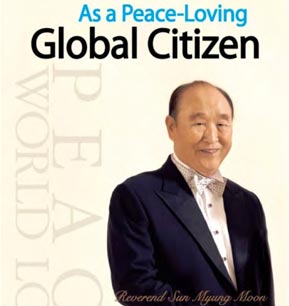ShareThis
Rev. Sun Myung Moon

As a Peace-loving Global Citizen is the autobiography of Rev. Sun Myung Moon, the founder of the Unification Movement. It was published in 2009 in both Korean and English by Gimm-Young Publishers of Seoul, South Korea. The book was released in South Korea on March 9, 2009 and debuted at #3 on the Businesss bestseller's list. It has ranked in various bestseller lists since then and was ranked 15th on the General bestseller's list as of October 14, 2009.
A Grain of Rice Is Greater Than the Earth
In winter the snow would be deeper than a person’s height. On cold winter mornings when we were marched through snow as deep as we were tall, my head would start feeling as though it was spinning. The frozen road was extremely slippery, and the cold wind blew so ferociously it made the hair on our heads stand up straight. We had no energy, even a.er eating breakfast, and our knees kept collapsing beneath us. Still we had to make our way to the job site, even if it meant dragging our exhausted legs along the way. As I made my way along this road that took us to the edge of consciousness, I kept reminding myself that I belonged to Heaven.
At the factory there was a mound of a substance that we referred to in a shorthand way as “ammonia.” In reality, it probably was ammonium sulfate, a common form of fertilizer. It would come in by conveyor belt and looked like a white waterfall as it fell off the belt onto the mound below. It was quite hot when it first came off the belt, and fumes rose from it even in the middle of winter. Quickly it would cool and become as solid as ice. Our job was to dig the fertilizer out of the mound with shovels and put it into straw bags. We referred to this mound that was over sixty-five feet high as “the fertilizer mountain.” Eight to nine hundred people were digging away at the fertilizer in a large space, making it appear as though we were trying to cut the mountain in half.
We were organized in teams of ten, and each team was responsible to fill and load 1,300 bags a day. So each person had to fill 130 bags. If a team failed to meet its quota, its meal rations were cut in half. Everyone worked as if his life depended on making the quota. To help us carry the bags of fertilizer as efficiently as possible we made needles out of steel wire and used these to help us tie the bags after they had been filled. We would put a piece of wire on a rail track that ran along the floor of the factory. The wire was flattened by having one of the small rail cars used for hauling materials run over it, and then it could be used as a needle. To open holes in the bags we used shards of glass that we got by breaking factory windows. The guards must have felt sorry to see their prisoners working under harsh conditions because they never stopped us from breaking windows in the factory. Once I broke a tooth while trying to cut a piece of wire. Even now you can see that one of my front teeth is broken. !is remains with me as an unforgettable memento from Heungnam Prison.
Wednesday, November 24, 2010
|
Labels:
A Grain of Rice Is Greater Than the Earth part2
|
CONTENT
- FOREWORD
- CHAPTER ONE - Food is Love
- CHAPTER TWO - A River of Heart Flows with Tears
- CHAPTER THREE - The Man with the Fullest Stomach
- CHAPTER FOUR - Why We Work Globally
- CHAPTER FIVE - True Families Create True People
- CHAPTER SIX - Love Will Bring Unification
- CHAPTER SEVEN - Future of Korea, Future of the Wor...
- CHAPTER EIGHT - Message for Young People

